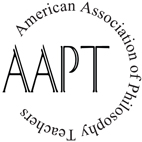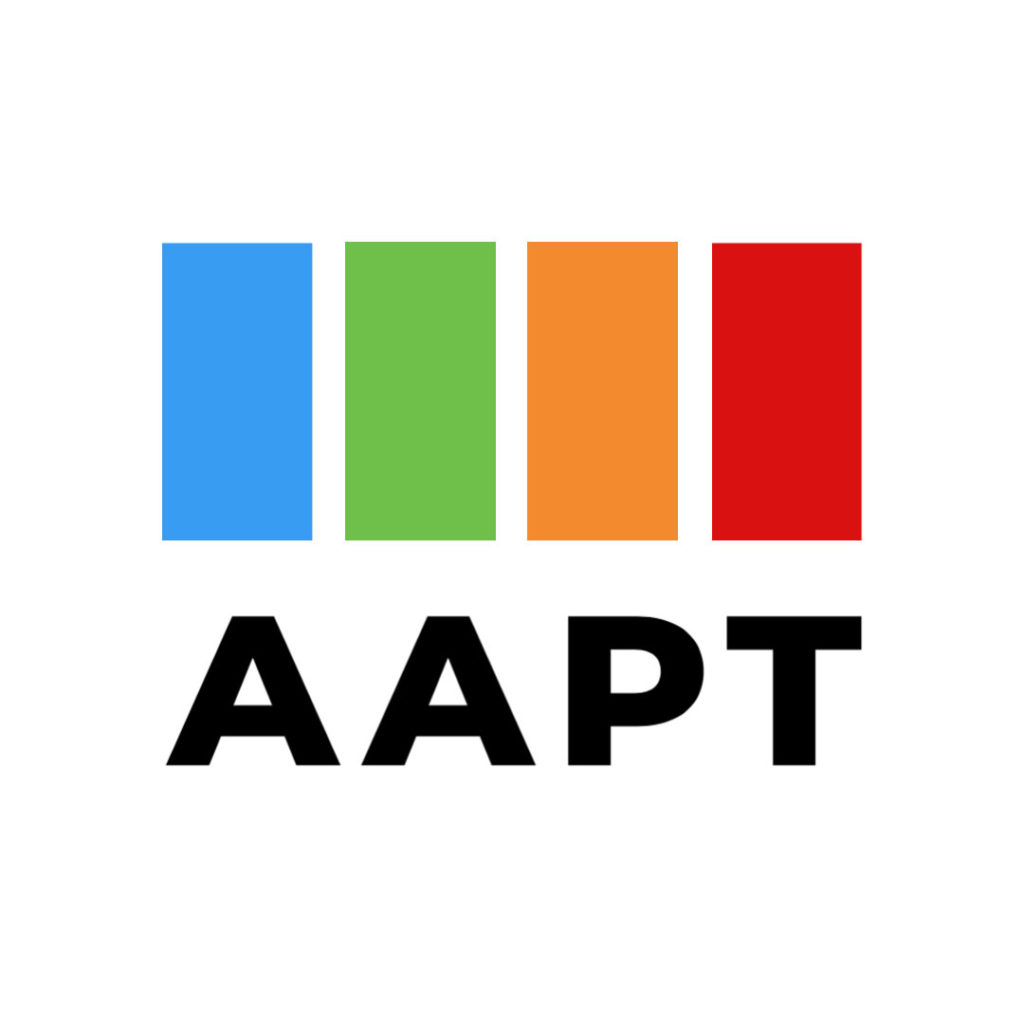Save the Dates: AAPT Talking/Teaching Series

Join the AAPT Teaching & Learning Committee for one-hour weekly conversations about teaching. Each week a facilitator will give a brief introduction to a pedagogical concept or topic, and then participants will discuss the topic with others who are interested in improving their teaching too!
No advance preparation or fee required.
You do not need to be a member of the AAPT to attend.
A registration link will be posted the last week of September.
Fall 2022 Schedule
10/3 (noon EST) David W. Concepción, Ball State University, Becoming a Good Ancestor
10/10 (3pm EST) Kirsten Denney and Karl Aho, Tarleton State University, Critical Thinking across the Core Curriculum
10/17 (noon EST) Ryan Miller, University of Geneva, From Specifications to Agile Grading
10/24 (3pm EST) Meica Magnani and Vance Ricks, Northeastern University, Value Analysis Design: Integrating Ethical Reasoning into a STEM Education
10/31 (noon EST) Maralee Harrell, University of California San Diego, Engaging Students in Required Philosophy Courses
11/7 (3pm EST) Jerry Green, University of Central Oklahoma, The Revealed Curriculum: Talking about College as Doing Philosophy
11/14 (noon EST) TBA
11/21 (3pm EST) Jack Musselman, St. Edward’s University, The Role of Humor in the Philosophy Classroom
11/28 (noon EST) Sarah Clairmont, McGill University, Philosophy and STEM
12/5 (3pm EST) Kevin Gannon, Queens University of Charlotte, Alternative Approaches to Assessment: It Doesn’t Have to Be Ungrading (if You Don’t Want it to Be)
Summary of Topics
10/3 (noon EST), David W. Concepción, Becoming a Good Ancestor
This facilitated conversation aims to help attendees articulate career goals as a teacher in higher education, particularly affective goals. I ask the question “What are your career goals?” by asking “What must you be doing right now to think that three generations hence you will deserve to be thought of as having left a good legacy with regard to the teaching portion of your entire career?” In particular, how do you build, and recharge or sustain, high levels of patience, generosity, and empathy with/toward the students you teach? What in fact makes you proud of yourself? Perhaps more importantly, what should make you proud of yourself as a philosophy teacher?
10/10 (3pm EST), Kirsten Denney and Karl Aho, Critical Thinking across the Core Curriculum
Our goal is to facilitate a discussion about teaching critical thinking to non-majors who take philosophy courses. We will give a brief overview of the skills that constitute critical thinking, discuss the role that instruction in philosophy has in the acquisition of these skills, and explore strategies to improve critical thinking skills in students taking philosophy courses. Some of these strategies include argument diagramming, real-world application of problems, and general instruction in logic in non-logic courses. Since our institution lacks a philosophy major, we will emphasize teaching critical thinking in so-called service courses and/or the university’s core curriculum. We will also highlight the roles of philosophy in specific majors at our institution, such as Ms. Denney’s psychology program (which requires Intro to Philosophy).
10/17 (noon EST), Ryan Miller, From Specifications to Agile Grading
Borrowing from their usage in software development, specifications have entered into philosophy grading practices. In both fields, these practices can improve clarity, quality, and motivation over older approaches. Nonetheless software developers came to recognize that specifications made more sense for relatively routine projects, where both the writers and implementers of the specification understood the problem well enough to benefit from an abstract specification. These same issues arise in philosophy grading, where new instructors (or those arriving at a new kind of institution) or students new to philosophy aren’t yet good at estimating how much work it will take to complete an abstract specification. Again borrowing from software, some educators have begun using a more “agile” approach: getting results quickly in more open-ended formats so that both parties better know what to expect. I will facilitate a discussion on (a) whether and when such more ‘agile’; approaches might be beneficial in philosophy and (b) what particular agile grading strategies make the most sense in the participants’ philosophy classrooms.
10/24 (3pm EST), Meica Magnani and Vance Ricks, Value Analysis Design: Integrating Ethical Reasoning into a STEM Education
An increasingly popular approach to encouraging ethical reflection and responsiveness in computer science educational contexts is to embed short ethics modules, taught by philosophers or interdisciplinary teams that include philosophers, into courses across the CS curriculum. We will briefly describe how we design and teach CS ethics modules rooted in Value Analysis in Design (VAD), a component of Value Sensitive Design (VSD). VAD modules bring careful attention to the values at stake in each choice made in the design process, and can deepen students’ ethical sensibilities and strengthen their general skills of ethical analysis. We will facilitate a discussion of the advantages and drawbacks of VAD as an approach to bringing ethical reflection into CS courses (and other STEM-related fields). We will also pose questions about the strengths and challenges of a modular approach.
10/31 (noon EST), Maralee Harrell, Engaging Students in Required Philosophy Courses
Often, we find ourselves teaching courses which are required for students for some reason or another: a general education requirement, a major requirement, etc. And as it often happens, there are students in these classes who just don’t want to be there, perhaps even feeling resentment for it. We may hope our enthusiasm for this discipline which we all find so fascinating will bring these students along, changing their minds. Or we may just sigh, and tell ourselves that there’s nothing we can do about that so we should just concentrate on creating a class for the students who do want to be there. But is there something we can do in between these two extremes? I would like to start a conversation about ways to design courses that will engage and encourage the eager students, but will not alienate students who aren’t so eager. I will share a couple of examples that I think might work, but I look forward to listening to any ideas the participants have as well.
11/7 (3pm EST), Jerry Green, The Revealed Curriculum: Talking about College as Doing Philosophy
This facilitated discussion begins with the case for reserving significant time at the beginning of the semester to explicitly discuss issues such as the transition to college, the difference in expectations for adult learning, study strategies, etc.. I will give examples of how these discussions are not separate from philosophy or intrinsically opposed to content coverage and I will provide resources that cover these issues while being philosophical, which allows instructors to help prepare students for the rest of the class (and for college in general) while also modeling the methods and topics they will encounter in the rest of the course. One direction for discussion is strategies and resources for modifying syllabi and schedules for the next semester.
11/14 (noon EST) TBA
11/21 (3pm EST), Jack Musselman, The Role of Humor in the Philosophy Classroom
I will provide a working definition of humor relevant to our philosophy classrooms, suggest all philosophy teachers have a “humor orientation” in their classrooms, make a moral case (especially appealing to the intellectual virtues) for including humorous examples in your pedagogical plans, and conclude with some social and political suggestions for including some humorous examples in your lesson plans.
11/28 (noon EST), Sarah Clairment, Philosophy and STEM
Unlike STEM, which involves much collaboration and practical training, philosophy is often viewed as an independent arm-chair exercise. Yet, despite these perceived differences, teaching philosophy to STEM students can be uniquely rewarding. I will facilitate a discussion around the issue of demonstrating the relevance of philosophy to STEM, without attempting to recruit STEM students into philosophy. I frame this discussion by raising three questions and responses/examples that draw from my own experiences teaching undergraduate courses in the philosophy of science and medicine.My framing questions are: What are some challenges STEM students interested in taking philosophy courses often face? How can philosophy teachers make success in philosophy more accessible to non-philosophy majors and STEM students in particular? How can philosophy teachers demonstrate the relevance of philosophy to future STEM research?
12/5 (3pm EST), Kevin Gannon, Alternative Approaches to Assessment: It Doesn’t Have to Be Ungrading (if You Don’t Want it to Be)
Much of the conversation around alternative (often critical) approaches to assessment and grading tends to fall under the broad category of “Ungrading.” But what is ungrading, exactly? Has it just become a shorthand term to describe substituting something indeterminate for traditional letter grades? And if so, does that serve either us or our student well? It’s easy to critique traditional letter grades as an assessment system. It’s harder to decide what, specifically, to do instead. We’ll look at the conversation around ungrading, but more importantly, consider some other approaches that might offer us and our students more nuance and flexibility, as well as an accurate reflection of what they really learned.


